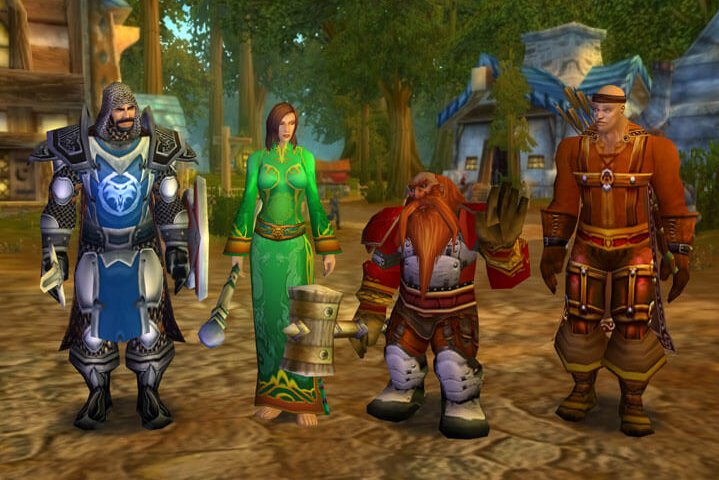

World of Warcraft is one of the biggest games of all time. It was first released in 2004, and by 2009 it had almost 10 million players. It is rumoured to have generated over $9 billion in revenue since its release.
On top of this, a major Hollywood film was released based on the game. South Park also did an episode about it, and Leroy Jenkins was immortalised in meme culture thanks to the game. But what you might not know is World of Warcraft has also generated interest in cryptocurrency as well.
Surprisingly, the relationship between World of Warcraft and cryptocurrency goes back further than you might think.
Within the game, players are able to purchase goods using the in-game currency known as gold. Whilst this might seem commonplace nowadays with V-Bucks in Fortnite, in-game currencies were not so common in the early days. The process was simple: you would purchase the gold with fiat currency and then use it to buy things in the game.
Certain items that could be looted from some of the toughest bosses soon became extremely valuable. Step up Brock Pierce, who began “farming” these rare items and selling them for a premium at a later date. Even more bizarrely, Pierce eventually formed a partnership with Steve Bannon – then of Goldman Sachs – with Pierce receiving $20 million and retaining a controlling stake in the company known as Internet Gaming Entertainment.
In using an online digital currency, gamers became used to online transactions, markets, and converting their money back to fiat. The difference between World of Warcraft’s gold and a cryptocurrency such as Bitcoin is that World of Warcraft’s gold is centrally owned by the developers. Whilst this allows them to manage the market and reduce volatility, it also means they retain the power to halt transactions and ban users for misbehaving.
When games such as World of Warcraft or Fortnite become extremely popular, there is the risk of black markets emerging outside the developers’ control. On top of this, scarier trends can occur. In 2011, it was revealed that Chinese prisoners were being forced to play World of Warcraft and farm for gold.
Game developers have tried to reduce such occurrences, although this has proven hard. Fortnite, one of the most popular games on the market, has been accused of abetting money launderers through its platform. This is one of the key reasons why decentralised cryptocurrencies could pose issues were they to be implemented within a gaming ecosystem.
Ownership of digital assets in games such as World of Warcraft is one issue that blockchain could solve. Were you to earn a very expensive item in the game but your account is accidentally deleted, you would lose that item. However, through blockchain technology, the ownership of that digital asset would remain yours.
Our resident gaming expert Jordan Heal has also explored the possibility of a gaming multiverse. He explains:
“The gaming multiverse is a collaborative effort of multiple game developers who are all contributing and developing games to coexist in one multiverse — spearheaded by Enjin. This gives players the benefits of being able to own an item in one game and use it in another.
“This is truly uncharted territory. In giving players the ability to own items across multiple games, they are able to embark on their own science-fiction journey where their character is reincarnated in different worlds and equipped with the loot they have earned through past experiences.
“It redefines the definition of role-playing. In one life, the player may have been a famed warrior who fought their way to victory, while in another, they may be living in a post-apocalyptic world trying their hardest to survive.
“With the ability to use in-game items between games, the player will be able to tap into a multiverse of their own, living any possibility they so choose.”
Whether gaming behemoths such as Electronic Arts or Ubisoft would subscribe to such a model is unlikely. Instead, the new breed of gaming companies will attempt to usurp them. The notion behind a gaming multiverse is certainly an attractive one for the players, but the traditional money-making developers might not be so keen to jump on the bandwagon.
As children and adults both adapt to more advanced gaming systems and markets within games, they are becoming acclimatised to new technologies and ideas. World of Warcraft is one such game that helped with this process.
With Facebook creating its own version of a cryptocurrency, it is presumed that when people begin using them, they will be less adverse to using other cryptocurrencies as well, boosting the popularity of the market as a whole.
Denver, Colorado, 24th February 2025, Chainwire
Denver, Colorado, 20th February 2025, Chainwire
Washington, D.C., 18th February 2025, Chainwire
Dubai, UAE, 27th January 2025, Chainwire
Those who enter the market at this time may be surprised to hear that Bitcoin…
George Town, Grand Cayman, 22nd November 2024, Chainwire